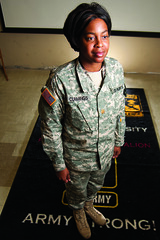Aimed to remind United States citizens of the sacrifices U.S. military members make serving the country, Veterans’ Day doesn’t always draw attention to the day-to-day difficulties veterans face after they return to their civilian lives.
Effective since August 2009, the Post-9/11 Veterans Educational Assistance Act – known as the new GI Bill – aids soldiers who hope to further their education with registration and reintegration. Offered through the U.S. Department of Veterans Affairs, it includes 36 months of tuition, financial benefits, yearly book stipends and housing assistance.

Paul Jokiel, a junior psychology major, is taking advantage of the bill’s benefits after he served a year in Iraq as a staff sergeant in the Army. He was interested in the military from a young age and served as a member of the Army Reserves before he was deployed to Iraq.
“It was really months of training for five minutes of, ‘Oh s—, oh s—, oh s—,’” Jokiel said. “I was involved in nine engagements [when I was shot at and returned fire], but that’s the best way I can characterize my time there.”
Jokiel first served as a combat convoy driver and then as a gunner, and he received a combat action badge for his service in Iraq. Upon his return to the U.S., Jokiel faced difficulties settling into a new lifestyle. He resumed his schooling at Kutztown University for two years, but he had trouble focusing and meeting the demands of his classes. He described experiencing what he called a substance problem immediately after he returned from Iraq.
“I drank a lot, which really affected me quite a bit – I wasn’t doing great in school,” Jokiel said. “I’d missed out on my last teenage year. All my friends had cool stories from college, and I felt like I had to catch up on that growth and the experiences that I’d missed.”
Jokiel transferred to the Virginia Military Institute and began training to be an army officer.
“I don’t know if it was something the military instilled in me, or if it was in me before, but I really benefit from structure,” he said. “Once I started at VMI, I made dean’s list, I was training other cadets and I joined student government.”
Jokiel eventually transferred to Temple, but said he still sees the military as a big part of his future.
“Psychology can be directly applied to the military, and I plan to make this my career,” Jokiel said. “A lot of guys are a lot less mentally able to handle combat than I am, and I want to be able to help [them].”
According to a recent study by the RAND Corporation, a nonprofit research organization, nearly 300,000 recent veterans have used the benefits of the new GI Bill and have enrolled in educational institutions since the benefits began. While many schools offer assistance for veterans, benefits aren’t always readily accessible and don’t always factor in the troubles that face veterans who return to school after service.
Major Dominique Cummings is the Reserve Officers’ Training Corps recruiting operations officer for Temple. She advises students who may be curious about ROTC or the military and those who definitely plan to enter the service.
And while she deals primarily with students who have not yet served, Cummings had her own experiences serving overseas and adjusting to civilian life.
“The biggest network for veterans coming off active duty is the VA,” Cummings said. “It is a big transition into the real world. They can tell veterans about available benefits and offer classes to help with reintegrating.”
Cummings, a single mother, was deployed to Panama with the Army Reserves and afterward, entered college. She said she is aware of the issues veterans face after what she described as “life-altering” experiences.
“When I was in the poor city of Panama I saw this little girl – she had to be about the age of my son at the time, 2 – and she was so hungry,” Cummings said. “I wasn’t rich, but we had food and water. If I could’ve taken that girl home, I would’ve been able to help her, and that’s the biggest frustration.”
Jokiel described his experience in Iraq as eye-opening, and he said seeing such a different world taught him a lot about how societies function.
“Over there, men can be comfortable with kissing each other on the cheek or holding hands, whereas here, that would be considered un-masculine,” Jokiel said. “Society is really just social construct – artificial rules that we set up, agree on and play by.”
His experiences also shaped his ideals about conflict, especially religious ones.
“A lot of my friends would say they’d want to see the Middle East ‘nuked’ into a piece of glass, and I really didn’t understand that,” Jokiel said. “This is a difference between Western and Eastern ways of thinking, but essentially it all boils down to religious conflict. In light of that, why are we hurting each other?”
Cummings said her experiences helped put certain things in perspective.
“As Americans, we don’t realize how blessed we are,” Cummings said. “Things that are problems to everyone here seem so petty in comparison.”
Kara Savidge can be reached at kara.savidge@temple.edu.



Be the first to comment